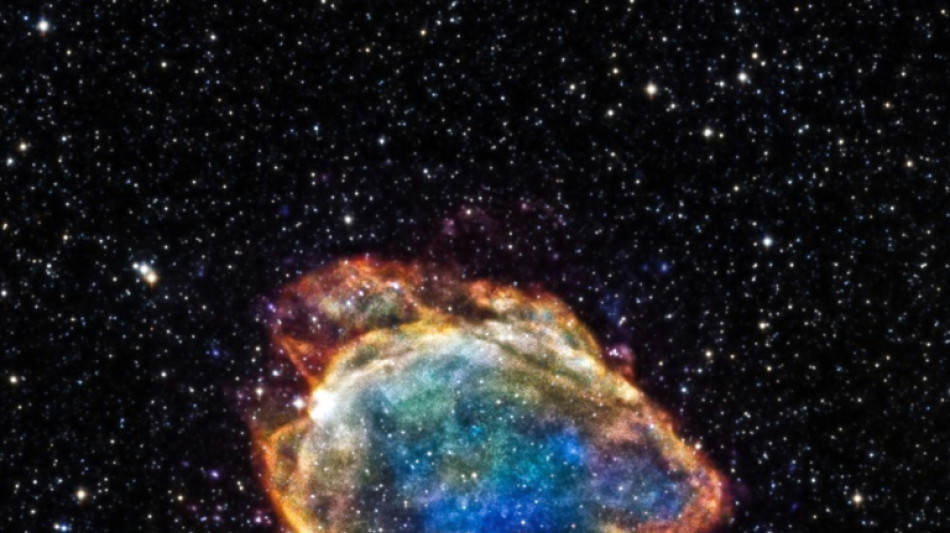
-
 Trail goes cold in UK abandoned babies mystery
Trail goes cold in UK abandoned babies mystery
-
Japan's Takaichi set to call February snap election: media

-
 Scientist wins 'Environment Nobel' for shedding light on hidden fungal networks
Scientist wins 'Environment Nobel' for shedding light on hidden fungal networks
-
From bricklayer to record-breaker: Brentford's Thiago eyes World Cup berth

-
 Keys overcomes serve demons to win latest Australian Open warm-up
Keys overcomes serve demons to win latest Australian Open warm-up
-
As world burns, India's Amitav Ghosh writes for the future

-
 Actor Kiefer Sutherland arrested for assaulting ride-share driver
Actor Kiefer Sutherland arrested for assaulting ride-share driver
-
Gilgeous-Alexander shines as Thunder halt Spurs losing streak

-
 West Bank Bedouin community driven out by Israeli settler violence
West Bank Bedouin community driven out by Israeli settler violence
-
Asian markets mixed, Tokyo up on election speculation

-
 US official says Venezuela freeing Americans in 'important step'
US official says Venezuela freeing Americans in 'important step'
-
2025 was third hottest year on record: EU, US experts

-
 Japan, South Korea leaders drum up viral moment with K-pop jam
Japan, South Korea leaders drum up viral moment with K-pop jam
-
LA28 organizers promise 'affordable' Olympics tickets

-
 K-pop heartthrobs BTS to kick off world tour in April
K-pop heartthrobs BTS to kick off world tour in April
-
Danish foreign minister heads to White House for high-stakes Greenland talks

-
 US allows Nvidia to send advanced AI chips to China with restrictions
US allows Nvidia to send advanced AI chips to China with restrictions
-
Sinner in way as Alcaraz targets career Grand Slam in Australia

-
 Rahm, Dechambeau, Smith snub PGA Tour offer to stay with LIV
Rahm, Dechambeau, Smith snub PGA Tour offer to stay with LIV
-
K-pop heartthrobs BTS to begin world tour from April

-
 Boeing annual orders top Airbus for first time since 2018
Boeing annual orders top Airbus for first time since 2018
-
US to take three-quarter stake in Armenia corridor

-
 Semenyo an instant hit as Man City close on League Cup final
Semenyo an instant hit as Man City close on League Cup final
-
Trump warns of 'very strong action' if Iran hangs protesters

-
 Marseille put nine past sixth-tier Bayeux in French Cup
Marseille put nine past sixth-tier Bayeux in French Cup
-
US stocks retreat from records as oil prices jump

-
 Dortmund outclass Bremen to tighten grip on second spot
Dortmund outclass Bremen to tighten grip on second spot
-
Shiffrin reasserts slalom domination ahead of Olympics with Flachau win

-
 Fear vies with sorrow at funeral for Venezuelan political prisoner
Fear vies with sorrow at funeral for Venezuelan political prisoner
-
Pittsburgh Steelers coach Tomlin resigns after 19 years: club

-
 Russell eager to face Scotland team-mates when Bath play Edinburgh
Russell eager to face Scotland team-mates when Bath play Edinburgh
-
Undav scores again as Stuttgart sink Frankfurt to go third

-
 Fuming French farmers camp out in Paris despite government pledges
Fuming French farmers camp out in Paris despite government pledges
-
Man Utd appoint Carrick as manager to end of the season

-
 Russia strikes power plant, kills four in Ukraine barrage
Russia strikes power plant, kills four in Ukraine barrage
-
France's Le Pen says had 'no sense' of any offence as appeal trial opens

-
 JPMorgan Chase reports mixed results as Dimon defends Fed chief
JPMorgan Chase reports mixed results as Dimon defends Fed chief
-
Vingegaard targets first Giro while thirsting for third Tour title

-
 US pushes forward trade enclave over Armenia
US pushes forward trade enclave over Armenia
-
Alpine release reserve driver Doohan ahead of F1 season

-
 Toulouse's Ntamack out of crunch Champions Cup match against Sale
Toulouse's Ntamack out of crunch Champions Cup match against Sale
-
US takes aim at Muslim Brotherhood in Arab world

-
 Gloucester sign Springbok World Cup-winner Kleyn
Gloucester sign Springbok World Cup-winner Kleyn
-
Trump tells Iranians 'help on its way' as crackdown toll soars

-
 Iran threatens death penalty for 'rioters' as concern grows for protester
Iran threatens death penalty for 'rioters' as concern grows for protester
-
US ends protection for Somalis amid escalating migrant crackdown

-
 Oil prices surge following Trump's Iran tariff threat
Oil prices surge following Trump's Iran tariff threat
-
Fashion student, bodybuilder, footballer: the victims of Iran's crackdown

-
 Trump tells Iranians to 'keep protesting', says 'help on its way'
Trump tells Iranians to 'keep protesting', says 'help on its way'
-
Italian Olympians 'insulted' by torch relay snub


Record measurement of universe suggests 'something is fishy'
The most precise measurements ever made of the universe's composition and how fast it is expanding suggest "something is fishy" in our understanding of the cosmos, the astrophysicist who led the research said Wednesday.
The comprehensive new study published in The Astrophysical Journal further confirmed that there is a significant discrepancy between two different ways to estimate the speed at which the universe is expanding.
The study said that around five percent of the universe is made up of what we might think of as normal matter, while the rest is dark matter and dark energy -- both of which remain shrouded in mystery.
Dark energy, a hypothetical force causing the universe to expand at an ever-increasing rate, makes up 66.2 percent of the cosmos, according to the study published in The Astrophysical Journal.
The remaining 33.8 percent is a combination of matter and dark matter, which is also unknown but may consist of some as-yet-undiscovered subatomic particle.
To arrive at the most precise limits yet put on what our universe is made up of, an international team of researchers observed exploding stars called supernovae.
They analysed the light from 1,550 different supernovae, ranging from close to home to more than 10 billion lights year away, back when the universe was a quarter of its current age.
"We can compare them and see how the universe is behaving and evolving over time," said Dillon Brout of the Harvard–Smithsonian Center for Astrophysics and lead author of the study, called Pantheon+.
- Two decades of analysis -
The study updated the data from the Pantheon project a couple of years ago, stamping out possible problems and nailing down more precise calculations.
"This latest Pantheon+ analysis is a culmination of more than two decades' worth of diligent efforts by observers and theorists worldwide in deciphering the essence of the cosmos," US astrophysicist Adam Reiss, 2011's physics Nobel winner, said in a statement.
It was by observing supernovae back in the late 1990s that Reiss and other scientists discovered the universe was not only expanding but also doing so at an increasing rate, meaning galaxies are racing away from each other.
"It was like if you threw a ball up, and instead of the ball coming down, it shot up and kept accelerating," Brout said of the surprise of that discovery.
Pantheon+ also pooled data with the SH0ES supernova collaboration to find what is believed to be the most accurate measurement for how rapidly the universe is expanding.
They estimated the universe is currently expanding 73.4 kilometres a second every megaparsec, or 3.26 million light years. That works out to be around 255,000 kilometres (160,000 miles) per hour, according to a Harvard-Smithsonian statement.
But there's a problem.
- The Hubble tension -
Measuring cosmic microwave background radiation, which can look much farther back in time to around 300,000 years after the Big Bang, suggests the universe is expanding at a significantly slower rate -- around 67 kilometres per megaparsec.
This discrepancy has been called the Hubble tension, after US astronomer Edwin Hubble.
The Pantheon+ results have raised the certainty of the Hubble tension above what is known as the five sigma threshold, which means the discrepancy "can no longer be attributed to luck", Brout said.
"It certainly indicates that potentially something is fishy with our understanding of the universe," Brout told AFP.
Some possible, unverified theories for the discrepancy could include another kind of dark energy in the very early universe, primordial magnetic fields, or even that the Milky Way sits in a cosmic void, potentially slowing it down.
But for now, Brout said that "we, as scientists thrive on not understanding everything.
"There's still potentially a major revolution in our understanding, coming potentially in our lifetimes," he added.
T.Samara--SF-PST




